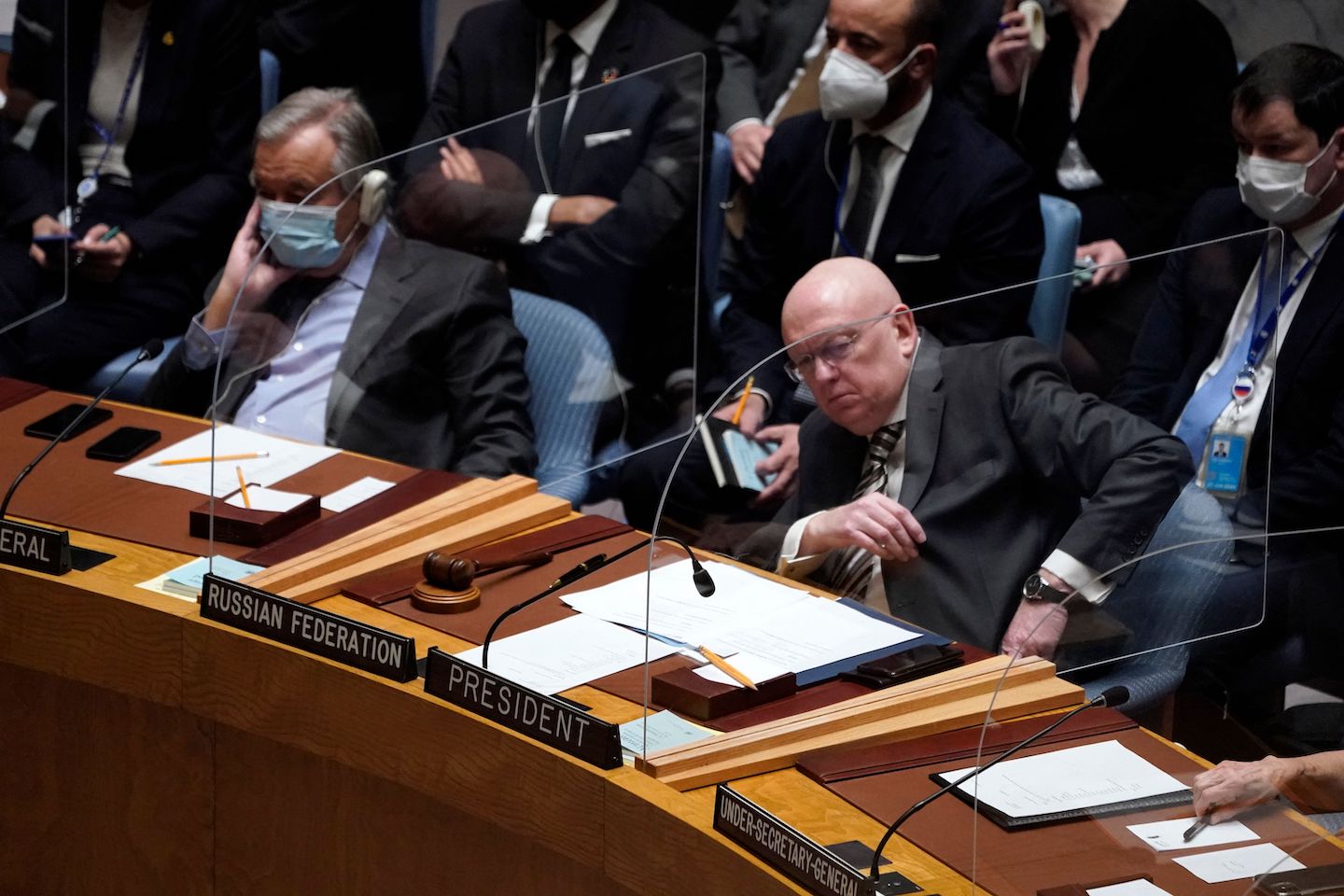As Russia Attacked Ukraine, Their Ambassadors Lashed Each Other in a UN Meeting
February 24, 2022As Russia launched attacks in Ukraine, the Ukrainian ambassador to the United Nations was in the same room as his Russian counterpart to discuss, ironically, the growing threat of a Russian invasion.
At a UN Security Council emergency meeting on Thursday morning, Ukrainian ambassador Sergiy Kyslytsya shot venomous words to Russian ambassador Vasily Nebenzya, condemning “the aggression that you have launched on my people.”
“There is no purgatory for war criminals,” he said. “They go straight to hell, ambassador.”
Nebenzya had just moments earlier denied that Russia was attacking Ukraine—even as, during that very same meeting, explosions erupted across the country and Russian troops invaded their neighbour.
Shortly after Russian President Vladimir Putin ordered a special military operation in the Moscow-backed separatist regions of Donetsk and Luhansk—collectively known as Donbas—on Thursday morning, Nebenzya insisted that their aim was to demilitarise, rather than occupy, Ukraine.
“During this meeting, the president of Russia, Putin, spoke and said that they’d made a decision for a special military operation in the Donbas,” Nebenzya said. “We don’t know all the details today, but briefly I would like to inform you that from his statement it says that the occupation of Ukraine is not in our plans. The aim of this special operation is to protect the people who for over eight years have been suffering genocide from the Kyiv regime, and for this we will aim to demilitarise and degenocide Ukraine and also hold accountable those who carried out so many crimes against civilians, including citizens of the Russian Federation.”
Kyslytsya argued that Putin’s authorisation of the military operation amounted to a declaration of war, and prodded Nebenzya to state on the record that Russia was not shelling and bombing Ukrainian cities, and that Russian troops were not moving into the territory of Ukraine.
Nebenzya did not.
It was around this time that reports and footage started emerging of explosions, missile attacks and gunfire breaking out in cities across Ukraine—including the capital Kyiv as well as Kharkiv, Dnieper and Mariupol.
“It’s too late, my dear colleagues, to speak about de-escalation,” Kyslytsya told the meeting. “The Russian president declared war on record.”
Holding up his phone and addressing Nebenzya, he asked: “Should I play the video of your president?”
“This isn’t called a war,” Nebenzya responded. “This is called a special military operation in Donbas.”

Nebenzya justified Russia’s military operations under article 51 of the UN charter, which allows for “self-defence,” following claims from the Kremlin that rebels in eastern Ukraine asked Russia for military aid in order to fend off acts of Ukrainian “aggression.”
UN High Commissioner for Human Rights Michelle Bachelet has meanwhile cautioned that “any significant escalation in military action creates a heightened risk of serious human rights violations as well as violations of international humanitarian law.” Bachelet made the statements on Tuesday after Putin officially recognised the independence of Donbas—itself a breach of international law—and endorsed the deployment of troops to the regions.
“I want to say in conclusion that we aren’t being aggressive against the Ukrainian people, but against the junta that is in power in Kyiv,” Nebenzya said, before swiftly adjourning the meeting.
Moments later, a reporter began to ask Kyslytsya whether he believed Nebenzya’s closing remarks. The Ukrainian ambassador cut her off.
“You can’t be serious—are you serious?” he said. “You want me to dissect the crazy lunatic semantics of a person whose president violates the charter; whose president declared a war, and he’s playing with words, and you ask me to interpret it? It’s lunacy … Absolutely.”
Ukraine’s deputy interior minister, Anton Gerashchenko, confirmed that the Russian invasion had begun in a statement posted to his official Facebook page, saying: “There have just been missiles on the military headquarters, airports, military warehouses, near Kyiv, Kharkiv, Dnieper. Gunfire at the border is underway. From this day, there is a new geopolitical reality in the world.”
A number of world leaders have condemned Russia’s invasion of Ukraine, including US President Joe Biden and UK Prime Minister Boris Johnson, as well as president of the European Commission Ursula von der Leyen and NATO Secretary-General Jens Stoltenberg.
Follow Gavin Butler on Twitter.
